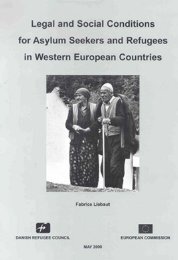Bulgaria - The social impact of seasonal migration
Bulgaria - The social impact of seasonal migration
Bulgaria - The social impact of seasonal migration
Create successful ePaper yourself
Turn your PDF publications into a flip-book with our unique Google optimized e-Paper software.
<strong>The</strong> following units are responsible for the administrative services and control with<br />
regard to the foreigners on the territory <strong>of</strong> the capital S<strong>of</strong>ia:<br />
- Student and Permanently Residing Foreigners;<br />
- Refugees;<br />
- Businessmen;<br />
- Tourists.<br />
<strong>The</strong> tasks <strong>of</strong> the National Border Police Service are defined by MIAA. This is a<br />
specialized security and investigation police force within the Ministry <strong>of</strong> Internal Affairs,<br />
responsible to guard the state border and to control the observance <strong>of</strong> the border<br />
regime. <strong>The</strong> Service exercises its powers and duties in the border zone, border<br />
checkpoints areas, at the international airports, in the internal sea waters, the territorial<br />
sea, the adjacent zone, the continental shelf, the <strong>Bulgaria</strong>n part <strong>of</strong> the Danube river and<br />
in the other rivers and water basins. <strong>The</strong> structure <strong>of</strong> the National Border Police Service<br />
corresponds to the enumerated tasks.<br />
As mentioned above, <strong>Bulgaria</strong> regulates visa issues through the Foreigners in the<br />
Republic <strong>of</strong> <strong>Bulgaria</strong> Act and the Regulation on the Terms and Procedures for Issuance<br />
<strong>of</strong> Visas by the Diplomatic and Consular Offices <strong>of</strong> the Republic <strong>of</strong> <strong>Bulgaria</strong>. <strong>The</strong> visa<br />
policy <strong>of</strong> the country is almost fully in compliance with Regulation 574/99 <strong>of</strong> the EU<br />
Council <strong>of</strong> 12 March 1999, enumerating third countries whose citizens must hold visas<br />
when crossing the external borders <strong>of</strong> the member states. <strong>Bulgaria</strong> has introduced<br />
unilaterally visa-free regime for individuals with standard international passport,<br />
citizens <strong>of</strong> the USA, Canada, Japan, Israel, New Zealand and Australia. <strong>The</strong> country has<br />
bilateral visa-free agreements with the Czech Republic, Poland, Slovenia, Slovakia,<br />
Hungary, Croatia, Lithuania, South Korea, Romania, San Marino, Macedonia and<br />
Yugoslavia.<br />
In accordance with a Decision <strong>of</strong> the Council <strong>of</strong> Ministers, adopted in December 2000,<br />
<strong>Bulgaria</strong> has started the procedure to terminate the bilateral visa-free agreements with<br />
Georgia, the Russian Federation, Ukraine and Tunisia. Due to that, the negative visa list<br />
<strong>of</strong> the country is almost fully in compliance with the EU/Schengen one. <strong>The</strong> difference<br />
is that <strong>Bulgaria</strong> will continue to have visa-free regimes with Macedonia and Yugoslavia<br />
- two countries that are included in the Schengen negative list. Both are neighbouring<br />
countries having minorities <strong>of</strong> <strong>Bulgaria</strong>n origin and close economic relations with<br />
<strong>Bulgaria</strong>. <strong>The</strong> above–mentioned Regulation enumerates 62 states qualified as<br />
representing “risk” with regard to illegal im<strong>migration</strong>. Citizens <strong>of</strong> these countries must<br />
meet additional requirements in order to obtain <strong>Bulgaria</strong>n visa including inter alia<br />
proving the aim <strong>of</strong> and the reasons for the visit, to demonstrate possession <strong>of</strong> financial<br />
resources for the return trip or return ticket respectively, to demonstrate possession <strong>of</strong><br />
financial resources to meet the cost <strong>of</strong> their living and others.<br />
As far as the sphere <strong>of</strong> return and readmission is concerned, <strong>Bulgaria</strong>n legislation is<br />
absolutely in compliance with the European acquis. When preparing readmission<br />
agreements, the Republic <strong>of</strong> <strong>Bulgaria</strong> observes Council Recommendation No 274/20 <strong>of</strong><br />
30 November 1994, giving the model form <strong>of</strong> bilateral readmission agreement between a<br />
65

















